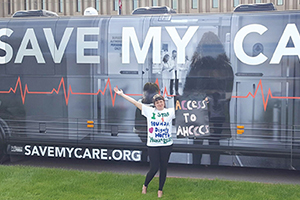By JULIE MINDA

Willett
By her late 20s, Jamie Willett had grown accustomed to feeling fretful and blue, but the sadness and stress wore on her.
"I just thought something was wrong with me," she recalls now. By the time she entered graduate school at Arizona State University in mid-2016, she was weary of her struggle and determined to get mental health treatment.
She signed up for Medicaid expansion coverage under the Affordable Care Act and has been using the insurance to access mental health care ever since. As a student without a full-time job, Willett's income has been below the 138 percent of the poverty threshold for Medicaid coverage set in the ACA.
Her university offers few mental health services, so Willett went to a counselor at the Bayless Health Group where she received a diagnosis of depression and anxiety, and a treatment plan. "I kind of already knew what I had, but hadn't gotten diagnosed," she says. After moving to Phoenix, "I was ready to receive help and tackle it."
She credits weekly individual counseling and group therapy sessions, and medication with helping her gain control of her anxiety, panic attacks and other symptoms. She continues to work with a counselor to maintain her progress.

Jamie Willett at the Feb. 14 Phoenix stop of the cross country Save My Care bus tour. Willett relies on Medicaid coverage under the Affordable Care Act expansion to pay for mental health care. Her coverage is through the Arizona Health Care Cost Containment System, the AHCCCS referenced in the sign she holds aloft. The bus tour is to oppose efforts to replace the ACA with legislation that threatens the health care of vulnerable populations. Save My Care is a project of the Alliance for Healthcare Security coaltion.
Willett, 31, will graduate next month with a master's in social work. She hopes to use her degree to work for systemic change and promote social justice by becoming a community organizer or advocate for the underserved.
She says she'll advocate for people with mental illness and work to counter the social stigma around mental health care and the resistance to providing the mentally ill with services.
People with mental health concerns, she says, "depend on services to be a productive member of society — and so do I.
"I feel like when people talk about making changes to the ACA or (cutting) Medicaid expansion, they forget about, or are unaware of, the mental health needs of many people. Limiting these programs would be detrimental to people's lives," she says.
"Without these services available to me, I really don't know where I'd be," she says.
Copyright © 2017 by the Catholic Health Association
of the United States
For reprint permission, contact Betty Crosby or call (314) 253-3490.